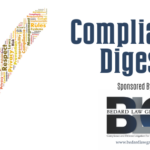I’m thrilled to announce that Bedard Law Group is the new sponsor for the Compliance Digest. Bedard Law Group, P.C. – Compliance Support – Defense Litigation – Nationwide Complaint Management – Turnkey Speech Analytics. And Our New BLG360 Program – Your Low Monthly Retainer Compliance Solution. Visit www.bedardlawgroup.com, email John H. Bedard, Jr., or call (678) 253-1871.

Every week, AccountsRecovery.net brings you the most important news in the industry. But, with compliance-related articles, context is king. That’s why the brightest and most knowledgable compliance experts are sought to offer their perspectives and insights into the most important news of the day. Read on to hear what the experts have to say this week.
Appeals Court Affirms Ruling for Defendant in FCRA Reasonable Investigation Suit
When reduced to a he-said, she-said situation as to whether a furnisher conducted a reasonable investigation into a dispute, a defendant saying it conducted a reasonable investigation — without evidence that proves it didn’t — is not enough, the Court of Appeals for the Second Circuit has ruled in a Fair Credit Reporting Act case. More details here.
WHAT THIS MEANS, FROM RICK PERR OF KAUFMAN DOLOWICH & VOLUCK: As with any lawsuit, the burden of proof rests with the person bringing the lawsuit. She must show that it is more likely than not that the evidence favors her. If she fails to meet that burden of proof, a jury must find for the defendant. It is called the preponderance of the evidence standard. It applies in all FDCPA and FCRA lawsuits. The United States Court of Appeals for the Second Circuit upheld the trial court’s order granting summary judgement to the defendant after plaintiff’s only proof that the investigation was unreasonable was that the defendant did not accept her dispute. The defendant claimed it reviewed the file and the underlying documents and concluded that the loan was not secured by fraud. Plaintiff failed to show what was unreasonable. This decision, while good for the industry, must be taken in context – it was brought by a plaintiff representing herself and not through an attorney. One can expect that an attorney would try to do a more thorough job of proving why simply looking at existing documents was not a good investigation, or at least enough to get to a jury and not summary dismissal.
THE COMPLIANCE DIGEST IS SPONSORED BY:

Judge Dismisses Three FDCPA Suits Filed by Same Plaintiff For Being Frivolous
A District Court judge in Georgia has dismissed three separate Fair Debt Collection Practices Act lawsuits filed by a plaintiff representing himself, ruling that in each of the cases the plaintiff failed to provide enough evidence to confirm that any of the defendants were, in fact, debt collectors. More details here.
WHAT THIS MEANS, FROM JENNA WILLIAMS OF FROST ECHOLS: Frivolous pro se lawsuits with bare allegations are always frustrating for our industry and they tend to stay on the docket longer than necessary. Engaging in a productive dialogue with pro se litigants can be challenging at times. These three Marshall cases are refreshing. I hope to see more courts step in and conduct a “frivolity review” early in cases.
Supreme Court Agrees to Hear Arguments in FCRA Case
Four years after initially denying a petition to hear arguments in a similar case, the Supreme Court has agreed to hear arguments in a Fair Credit Reporting Act case that seeks to determine whether the federal government can be held liable for misreporting information to the credit reporting agencies. More details here.
WHAT THIS MEANS, FROM BRENT YARBOROUGH OF MAURICE WUTSCHER: The only question presented in this appeal is whether the federal government enjoys sovereign immunity with respect to civil damages sought under the FCRA. Those looking for this Supreme Court to provide guidance on other aspects of the FCRA, such as “reasonable” investigations or “willful” violations, will likely need to wait for a future case.
Judge Grants MSJ for Defendant in FCRA Reasonable Investigation Case
If you’re going to sue a collection operation for not reasonably investigating a dispute on your credit report, it’s probably best to file the dispute before you file the lawsuit claiming the dispute was not reasonably investigated. A District Court judge in New York has agreed to adopt a Magistrate judge’s recommendation that the defendant’s motion for summary judgment in a Fair Credit Reporting Act case be granted. More details here.
WHAT THIS MEANS, FROM DAVID SHAVER OF SURDYK, DOWD & TURNER: The lesson for ARM defendants to take from Owoyemi is that each element necessary to prove up a claim, whether under the FCRA or otherwise, is there for a reason. When evaluating claims, ARM defendants should take care to leave no stone unturned lest a possible successful defensive argument be overlooked. In Owoyemi, the failure of proof on a critical threshold element – that the furnishing agency actually received the notice of the dispute necessary to trigger its investigatory obligations – was dispositive. And, if the agency had not prevailed on that issue, it wisely gave the Court multiple other legitimate reasons to dispose of the claims against it.
Though this lesson may seem more applicable when dealing with pro se plaintiffs, like the agency in Owoyemi was, it should be remembered in all cases. Many lawyers who bring these kinds of claims on behalf of consumers do so on a volume basis and may be prone to overlook a detail or two. So long as ARM defendants continue to work cooperatively with their counsel so that vulnerabilities in opposing positions can be identified and attacked, more decisions like the one in Owoyemi should be in the forecast.
Collection Law Firm Fighting CFPB CID Files Petition with Supreme Court
As expected, a collection law firm that has been fighting a Civil Investigative Demand from the Consumer Financial Protection Bureau for five years has submitted a petition to the Supreme Court to hear arguments in its case, positing that the funding structure of the agency violates the Appropriations Clause of the Constitution and renders the CID unenforceable. More details here.
WHAT THIS MEANS, FROM STEFANIE JACKMAN OF TROUTMAN PEPPER: Most likely, the petition will not be granted since the issue already is pending before the Court for decision in the next term. But it makes sense to preserve the issue and it is a little surprising the CFPB did not agree to a stay under the circumstances. However, the decision of whether to follow course and object to pending CFPB lawsuits and investigations remains a very fact-specific and case-specific consideration that does not lend itself to easy or uniform answers. Nor are we seeing uniform decisions on stay petitions from courts.
I’m thrilled to announce that Bedard Law Group is the new sponsor for the Compliance Digest. Bedard Law Group, P.C. – Compliance Support – Defense Litigation – Nationwide Complaint Management – Turnkey Speech Analytics. And Our New BLG360 Program – Your Low Monthly Retainer Compliance Solution. Visit www.bedardlawgroup.com, email John H. Bedard, Jr., or call (678) 253-1871.














